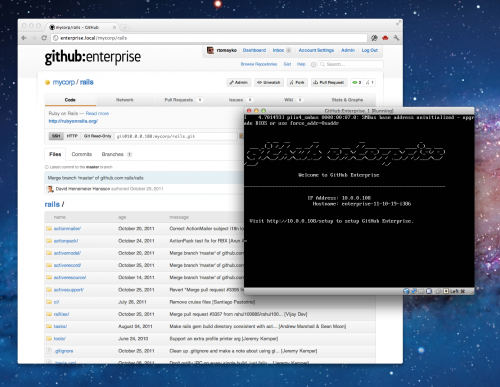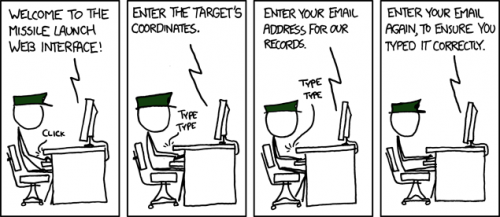How would you describe the Internet in one sentence? I didn’t think you can. But Georgie, the five year old blogger character from Being Five comics, nails it.
Category: Technology
I work in technology sector. And I do round a clock, not only from 9 to 5. It is my bread and butter, it is my hobby, it is the fascination of my life. And with the current rate of change particular in information technology (IT), there is always something new to learn, to try, to talk about. I often post news, thoughts, and reviews. And when I do, this is the category I use.
GitHub Enterprise announced
GitHub – the place to host and manage your source code – announced the release of GitHub Enterprise. GitHub Enterprise is a self-hosted version of GitHub. What I find the most interesting is the pricing.
GitHub Enterprise is priced at $5,000 per 20 users, per year. It comes with everything you need in one tidy package: code browsing, code review, issue tracking, wikis. No extra software to buy, no extra software to install, no extra software to manage.
The target is not on the disk space (understandable, with your own severs) or private repositories, but on the number of developers. $5,000 per 20 developers per year is $250 per developer per year, or about $20 per developer per month. That’s not too much, especially when compared with the salaries paid to the same developers each month. A fraction of the salary.
So, not only GitHub Enterprise is an excellent option for those companies that cannot use third-party hosting for source code, but it is also a Christmas present for those companies that work on a lot of projects. With private repositories, the price of a regular GitHub organizational subscription can go up pretty fast. With GitHub Enterprise you’d be able to have everything in-house for a tiny fee, compared.
It’ll be interesting to see how well this business will go for GitHub. It sounds viable to me. Convenient and not too expensive. With easy OVF-based installation, that would work on many virtual machines (VMware, VirtualBox, etc), with additional features for enterprise integration (LDAP!), I don’t see why not.
Shakespear? Yes, sure
Daily Post, a blog that suggest a topic to write a blog post about for each day of the year, raises an interesting question: do you think Shakespear existed? Apparently, a few people doubt the fact because there is way too much work credited to him for a single person to create.
While I’m not that big on history in general and Shakespear in particular, I do have an opinion on the “too much work” reasoning. I’ve heard it before a few times and it was wrong every time I’ve heard it.
15-20 years ago, before the Internet was mainstream, most of the Russian connected people were using the FidoNet. As with any community, there were celebrities in FidoNet, and one of them was a writer under the name of “Alex Exler”. He was credited with so much stuff that rumors were going around that Alex Exler is not really a person, but a creative group of a few individuals. It turned out to be false. Alex Exler is a somewhat known writer, and a very well-known blogger on the Russian web. These days he has a website as Exler.ru. The website is updated daily with movies and gadgets reviews, opinions on software and political news, personal experiences and what not.
10-15 year ago, when I was just getting into the world of Linux and other Open Source software, I’ve heard rumors that Alan Cox is not really a human, but a bunch of goblins working underground around the clock. Alan’s contribution to Linux kernel and many other software projects was huge. More so, he seemed to have never slept. His patches were coming out any time of the day, he replied to his emails within minutes, and also managed to somehow follow all the discussion at Linux Kernel Mailing List (aka LKML) – a mailing list known for its huge traffic. Of course, Alan Cox is not a bunch of goblins. He is a very talented and productive individual.
Without knowing too much about Shakespear, I think that it is much more probable that William was a very talented and productive individual rather than he never existed or he was a group of people.
Zed Shaw : Why I GPL
Zed Shaw, the guy behind a lot of code and several books, shares his thoughts on why he is now switching from simpler, more permissive licenses like BSD and MIT, to GPL. Most of the Linux people and GPL fans would easily guess the reasons, since they’ve popped up in pretty much every license related flame war. But it’s nice to hear from someone who did actually experience the theory, and who really knows what he is talking about.
I’ll always be an open source developer, but quite frankly, we’re dying off because the companies who use our software do not give back. The irony of the situation is that, in order to improve my motivation to do open source, I have to charge for it.
I obviously won’t ever charge an open source project, since they are honoring the unwritten contract: If I give, you give.
But the days of quick-flip corporations and ingrate programmers making money on my software are over. My new motto is:
Open source to open source, corporation to corporation.
If you do open source, you’re my hero and I support you. If you’re a corporation, let’s talk business.
Welcome to the GPL camp, Zed.
The important field
This xkcd comic strip nails one of the most frequent problems with modern web interfaces. Web forms will ask you confirm and re-confirm anything and everything, but the actual important information that is easy to make a mistake with. The rule of thumb here is, of course, only ask to confirm the password fields, because the data in them is not visible, so it does make sense to check that the user actually typed in what he thinks he typed in. Asking to enter email address once again is stupid, because, email address is usually displayed in a visible field, because email address is a frequently used string, which most people type automatically, and because the user won’t bother with re-typing but will just copy-and-paste from a previous field.


